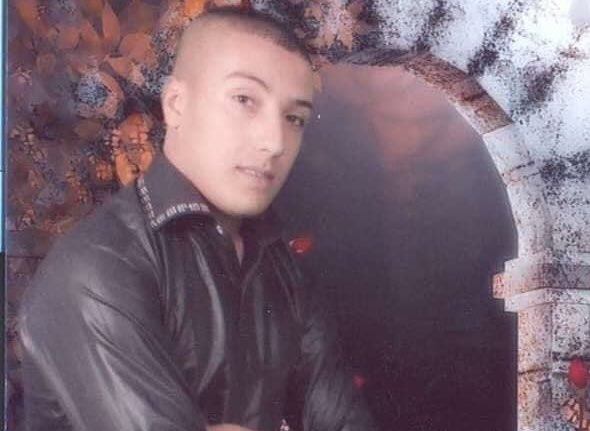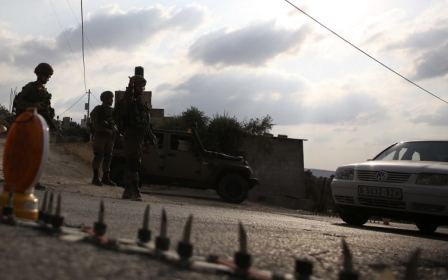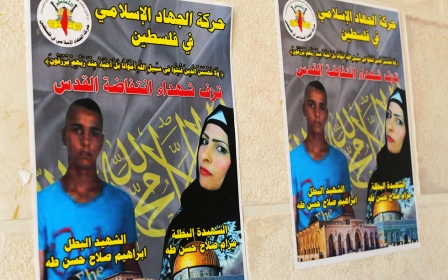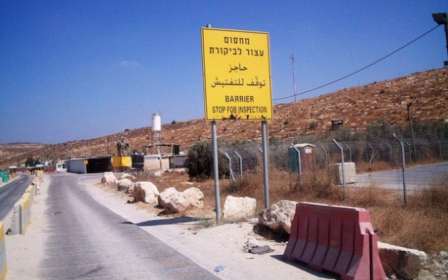'Wrong place at the wrong time': Family reject Israeli accusations against slain Palestinian

Israeli police forces shot and killed a young Palestinian man in the southern occupied West Bank on Tuesday morning after an alleged attempted car-ramming attack - an accusation his family vehemently denied.
Relatives told Middle East Eye that the slain man, 24-year-old Omar Hassan al-Awawda, was shot several times in the back by Israeli forces near the illegal separation wall close to the village of Idhna in the Hebron district.
“He was passing through the area where the soldiers were and they started following him,” Hani Awawda, one of Awawda's cousins, told Middle East Eye. “He started driving away and they shot him six times in the back from a close range. One bullet passed straight through his heart.”
According to Palestinian Authority news agency Wafa - whose office in Ramallah was raided by Israeli forces on Monday - Awawda was left bleeding on the ground until a Palestinian ambulance was able to reach him and take him to the al-Ahli hospital in Hebron city, where he was declared dead on arrival.
Israeli police spokesperson Micky Rosenfeld said in a statement that a “suspect Palestinian drove his vehicle at a security vehicle and then attempted to drive into border police officers who were securing the area”.
Rosenfeld said the police officers then shot at the Palestinian, adding that no Israelis were injured in the incident.
The exact circumstances of the shooting - including how Awawda would have been shot in the back if he was speeding towards the soldiers - remain unclear.
But for Hani Awawda, the 24-year-old could not have committed an attack.
‘His only mistake today, the only thing he did wrong, was he was just in the wrong place at the wrong time. And he paid that price with his life.’
- Hani Awawda, cousin of Omar Awawda
"I was with him last night, he was so normal, I didn’t feel there was anything strange about him, like he was stressed or planning to carry out an attack the next day," the 42-year-old said.
“Omar won’t do something like this, he’s a simple person. He’s never been arrested by the soldiers or been imprisoned, or been called in for interrogation. He is just a hard worker who tries to provide for his family,” Hani added.
"His only mistake today, the only thing he did wrong, was he was just in the wrong place at the wrong time. And he paid that price with his life."
Families of Palestinians killed by Israeli forces in the occupied territory often point out that the presence of flying checkpoints - as was the case in Idhna on Tuesday - unexpected military patrols and the confusion arising from the complicated system of roads in the West Bank make it difficult to ascertain whether their relative did indeed intend to carry out attacks or got caught up in traffic incidents.
“We are sure that he just didn’t hear or see them signalling him to stop and just kept driving,” Hani Awawda said.
After Awawda’s body was taken to the hospital, soldiers reportedly followed the ambulance, his cousin said, leading the family to fear that they would try to confiscate his body - as is often the case when Palestinians are killed while allegedly carrying out attacks against Israelis.
“When we were in the hospital, we received news that the Israelis were surrounding the hospital to take Omar’s body, so the hospital opened another door for us and the guys took him out and got his body back to the village so we could give him a proper burial,” Hani said.
“We had to rush to bury him in only 30 minutes so the Israelis couldn't take his body from us.”
Hani Awawda described his cousin as a “gentle and well mannered young man” who had dropped out of school at 12 years old to support his family after the death of his father.
“We can't describe how we feel right now. It is so difficult for us,” he said. “This is our land. We pay with our lives, with our homes, with our children. But this doesn’t stop us from demanding our rights to live in our land with freedom and dignity.”
Middle East Eye propose une couverture et une analyse indépendantes et incomparables du Moyen-Orient, de l’Afrique du Nord et d’autres régions du monde. Pour en savoir plus sur la reprise de ce contenu et les frais qui s’appliquent, veuillez remplir ce formulaire [en anglais]. Pour en savoir plus sur MEE, cliquez ici [en anglais].




